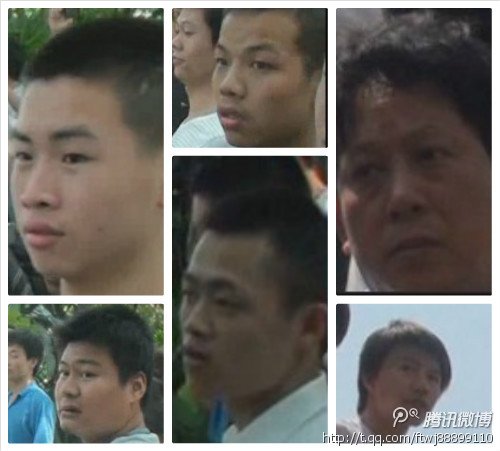Police ask netizens to help catch wild protesters
 0 Comment(s)
0 Comment(s) Print
Print E-mail China Daily, September 24, 2012
E-mail China Daily, September 24, 2012
Police have posted photos of more than 20 suspects on social media websites to solicit clues, as investigations continue into the beatings and looting during anti-Japan protests last week.
 |
|
Police have posted photos of more than 20 suspects on social media websites to solicit clues, as investigations continue into the beatings and looting during anti-Japan protests last week. |
So far, 18 people in Guangdong province, six in Shandong province and five in Hunan province, have been detained on suspicion of causing injury, vandalizing Japanese-brand cars and Japan-related businesses, and looting as demonstrations flared in more than 80 Chinese cities.
The protests erupted after Japan "nationalized" the Diaoyu Islands on Sept 11. Those islands have belonged to China for centuries.
On Saturday night, Shenzhen police posted the photos of 20 suspects on the department's micro blog, rather than on its website, saying it had solid evidence of vandalism and damage to other people's property.
The police urged the suspects to turn themselves in and offered rewards for information on their whereabouts, providing numbers for three hotlines.
The posts had been forwarded more than 4,000 times by Sunday evening.
An officer at the Shenzhen public security bureau said the public has "cooperated enthusiastically", adding that the authority had received more than 100 calls since the online announcement.
"Micro blogs are very powerful," said an officer who answered one of the hotlines. "We've received a lot of information, much more than we had in recent days."
He said the hotline was so busy that the bureau had three people answering the calls, though some people had called to learn the latest in the investigation.
Previously, the Shenzhen police had solicited the public's opinion on social media, but this was the first time they used it for a particular case, he said.
On Saturday, police in Xi'an, Shaanxi province, also posted photos of a person they said had smashed a Toyota and injured the car's owner on Sept 15.
At 3 pm that day, the car's owner Li Jianli, encountered anti-Japan demonstrators, some wielding batons and bricks, who attacked the car. One hit Li with a U-shaped lock made of steel, fracturing his skull. Li fell unconscious and was moved out of an intensive care unit after three days.
Police said the photos of the attack on Li and his family had been taken by surveillance cameras.
Netizens provided two more pictures of Li's attacker to police. One shows the suspect and another man talking and smiling - instead of being gripped by rage - as they destroyed cars.
"Please forward the information and give us valuable clues," Xi'an police wrote on the department's micro blog.
The post listed the cell phone number of an "officer Luo", in addition to three landline numbers, for informants to contact.
Officer Luo declined to comment when called by a China Daily reporter on Sunday.
Police in other regions have also attempted to harness the broadcasting capacity of social media for gathering information.
Police in Changsha, Hunan, began collecting clues of extreme acts on Sept 17.
In Qingdao, Shandong, police posted their phone number and an e-mail address for informants on their micro blog early Wednesday morning.
Within three hours, Qingdao police updated a second notice, "as many citizens had given in clues, we decided to put in one more hotline for informants."
"People of Qingdao, we have to give information to protect our homes," one micro-blogger responded.
Another, who goes by the name BaXunYe, told the Changsha police that some people robbed in the name of "being patriotic" and we should not allow them to "defile other people's love for their country.
"We cannot show leniency to anyone who takes advantage of others' patriotism."
Changsha police reported on their micro blog that most of the people they detained were unemployed.
Police in Shenzhen said among the seven suspects they detained, some joined the frenzy after learning of it from the Internet or joining the crowds spontaneously.
This is not the first time police have turned to social media for help in difficult cases.
Changsha police posted pictures of the serial killer Zhou Kehua on micro blogs and promised a 300,000 yuan ($47,500) reward for clues leading to his arrest.
Sina Weibo alone had 368 million registered micro blog users as of June.
Jin Gaofeng, an associate professor at the Chinese People's Public Security University, said the Ministry of Public Security has been advocating that police make use of new media and social media.
"As a fast communication tool that reaches huge numbers of people, a micro blog is an innovative platform for police to get support and feedback from the public," Jin said.





